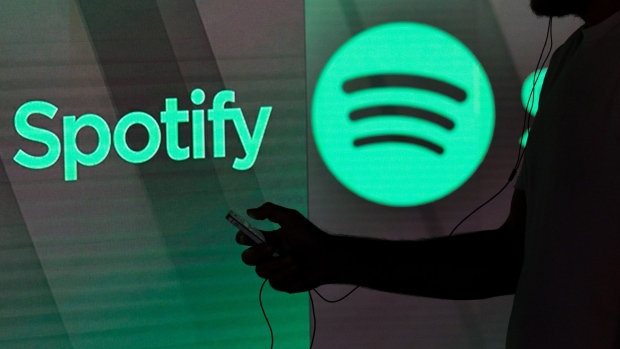Jun 3, 2020
Spotify, Music Labels Pledge to Fight Racism After Public Rebuke
, Bloomberg News

(Bloomberg) -- Spotify Technology SA has committed $11 million to combat racism, injustice and inequity, following calls from its employees to support the black community that has helped fuel its success.
The company will match up to $10 million of donations to organizations focused on fighting injustice, Chief Executive Officer Daniel Ek said in a memo to staff. The company will also donate $1 million in advertising inventory to social-justice groups over the coming months. On Tuesday it used $345,000 worth of advertising to promote its black history hub.
The music industry is just beginning to reckon with demands for reform from their employees and artists. While many of the most popular and prominent musicians in the world are black, all three of the major records labels, the world’s biggest concert promoter and its two largest music services are run by white men.
Spotify operates the world’s largest paid music streaming service, and has attracted 130 million paying subscribers relying heavily on black artists. On Wednesday, four of the five most popular songs on the platform were from black performers. Yet none of the company’s board members or senior-most leaders are black.
“Spotify is harnessing the power of our platform, the passion of our people, and the full weight of our company resources to support the black community and the fight against systemic racism, injustice, and inequity,” the company said in a statement.
Town Hall
Spotify held a town hall on Wednesday moderated by two employees from the Perception Institute, a group of researchers, educators and social-justice advocates. The company has also pledged to make hiring more inclusive. The company’s Black Lives Matter playlist added more than 400,000 followers this week thanks to in-app promotion.
It isn’t yet clear if these actions will quell the frustrations of Spotify’s employees or artists, who have called on the company to take action.
“I have brought this up in every internal channel available to me and leadership has remained passive,” Peter Bresnan, a producer at Spotify, said Wednesday on Twitter. “So I need help.” Former Spotify employees responded on the social network that they were disappointed with the lack of progress at the company.
The company began offering a donation match after the killing last week of George Floyd, who died while being restrained by Minneapolis police officers.
Spotify has a checkered history with the black community. The company angered many artists and managers with a policy that punished artists for personal misconduct.
Though designed to punish men who had committed sexual assault at the height of the #MeToo movement, the policy was seen as disproportionately targeting African-American artists since the first people punished were R. Kelly and XXXTentacion. The company had taken no action against the many white men who have been accused of sexual assault in their past.
Spotify scrapped the policy, and Troy Carter, the company’s most visible black employee and its liaison to the artistic community, left a few months later.
Music’s Role
Spotify isn’t the only music company facing calls to reform. The entertainment industry has long served as a focal point of the civil rights movement, with people of color and women in prominent roles in sports, music, film and TV.
Two music executives started a hashtag that emerged into a social movement Tuesday, prompting millions of people to post a black square on social media, and many companies to gave their workers the day off to reflect on how they can do their part in the fight against injustice.
Yet many artists found the #BlackoutTuesday movement counterproductive, drowning out calls for action and reform.
And while Warner Music Group Corp. and its owner, Len Blavatnik, pledged $100 million to support charitable causes related to the music industry and social justice, it did so on the same day its owners received $1.9 billion from the proceeds of an initial public offering. All of that money will go to existing shareholders and select employees.
Steve Cooper, chief executive officer, said his company is “broadly diversified.” But when asked about the lack of diversity on his board and among his direct reports, he said, “We must correct it.”
©2020 Bloomberg L.P.





